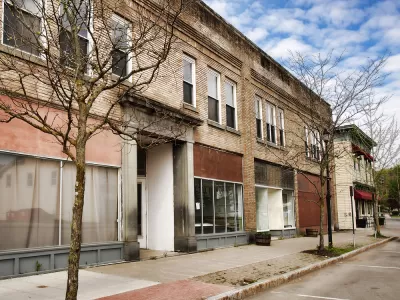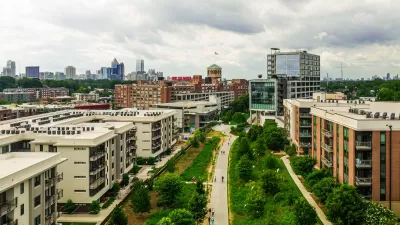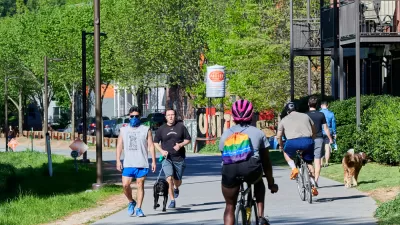One Atlanta neighborhood is experimenting with an ownership model that lets residents buy shares in a community-owned property.

The topics of gentrification and displacement frequently come up when discussing residential neighborhoods, but, as Adina Solomon reports, rising costs and neighborhood change also negatively impact small businesses. One organization in Atlanta is working to address commercial gentrification through a community ownership model.
In Southwest Atlanta's Capitol View, a historically Black neighborhood, residents are concerned that absentee landlords who buy up properties in the neighborhood don't take into account local needs when they renovate buildings and rent space. Consequently, residents don't get the services and retail that they need. The Guild, an "organization focused on building community wealth and closing the racial wealth gap in Atlanta," is testing a community-owned real estate model that aims to put control and profits into local hands and support Black entrepreneurs and legacy businesses. "The organization realized that if it wanted to close the racial wealth gap, it needed to own real estate for the first time." In November 2020, it purchased its first property, a white brick building on Dill Avenue, which it plans to redevelop. "The ground floor will have retail, including a grocery store that the neighborhood requested, and the top two stories will have housing, perhaps 15-17 units. "
"The Guild’s model is a community real estate trust that allows for anyone in the building’s 30310 ZIP code to contribute $10-100 a month. That investment goes into shares of the trust. Resident investors get a return through an annual dividend and the share price, which is tied to property values in this gentrifying neighborhood. The idea is to shift returns from developers to the community." The model operates on the belief that while neighborhood change may be inescapable, when ownership shifts from developers and their investors to the community, projects will benefit local entrepreneurs and long-term residents. "Capitol View, for example, has already gentrified to a certain degree," says Nikishka Iyengar, founder and CEO of The Guild, in the article. "We have to be super mindful about making sure we’re centering legacy residents that are still left."
FULL STORY: An Atlanta Neighborhood Will Finally Own Property as a Community

Planetizen Federal Action Tracker
A weekly monitor of how Trump’s orders and actions are impacting planners and planning in America.

San Francisco's School District Spent $105M To Build Affordable Housing for Teachers — And That's Just the Beginning
SFUSD joins a growing list of school districts using their land holdings to address housing affordability challenges faced by their own employees.

The Tiny, Adorable $7,000 Car Turning Japan Onto EVs
The single seat Mibot charges from a regular plug as quickly as an iPad, and is about half the price of an average EV.

Seattle's Plan for Adopting Driverless Cars
Equity, safety, accessibility and affordability are front of mind as the city prepares for robotaxis and other autonomous vehicles.

As Trump Phases Out FEMA, Is It Time to Flee the Floodplains?
With less federal funding available for disaster relief efforts, the need to relocate at-risk communities is more urgent than ever.

With Protected Lanes, 460% More People Commute by Bike
For those needing more ammo, more data proving what we already knew is here.
Urban Design for Planners 1: Software Tools
This six-course series explores essential urban design concepts using open source software and equips planners with the tools they need to participate fully in the urban design process.
Planning for Universal Design
Learn the tools for implementing Universal Design in planning regulations.
Smith Gee Studio
City of Charlotte
City of Camden Redevelopment Agency
City of Astoria
Transportation Research & Education Center (TREC) at Portland State University
US High Speed Rail Association
City of Camden Redevelopment Agency
Municipality of Princeton (NJ)





























